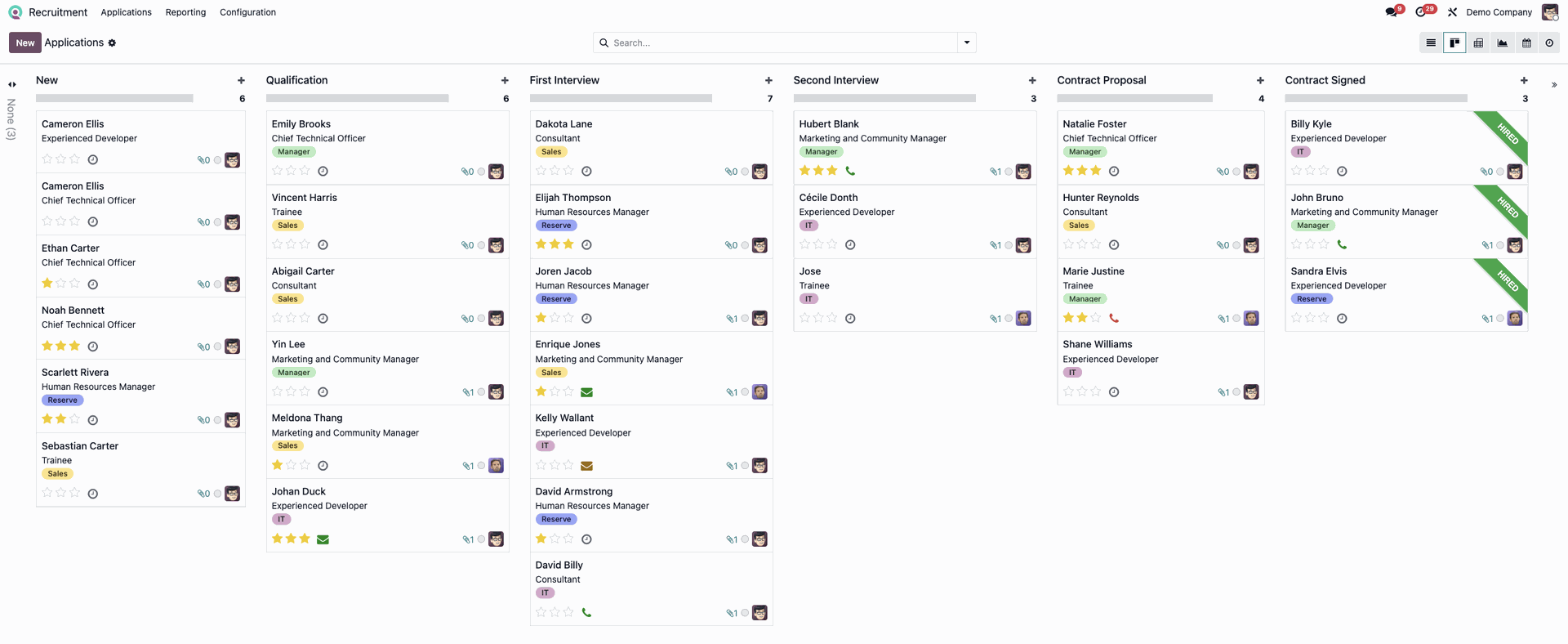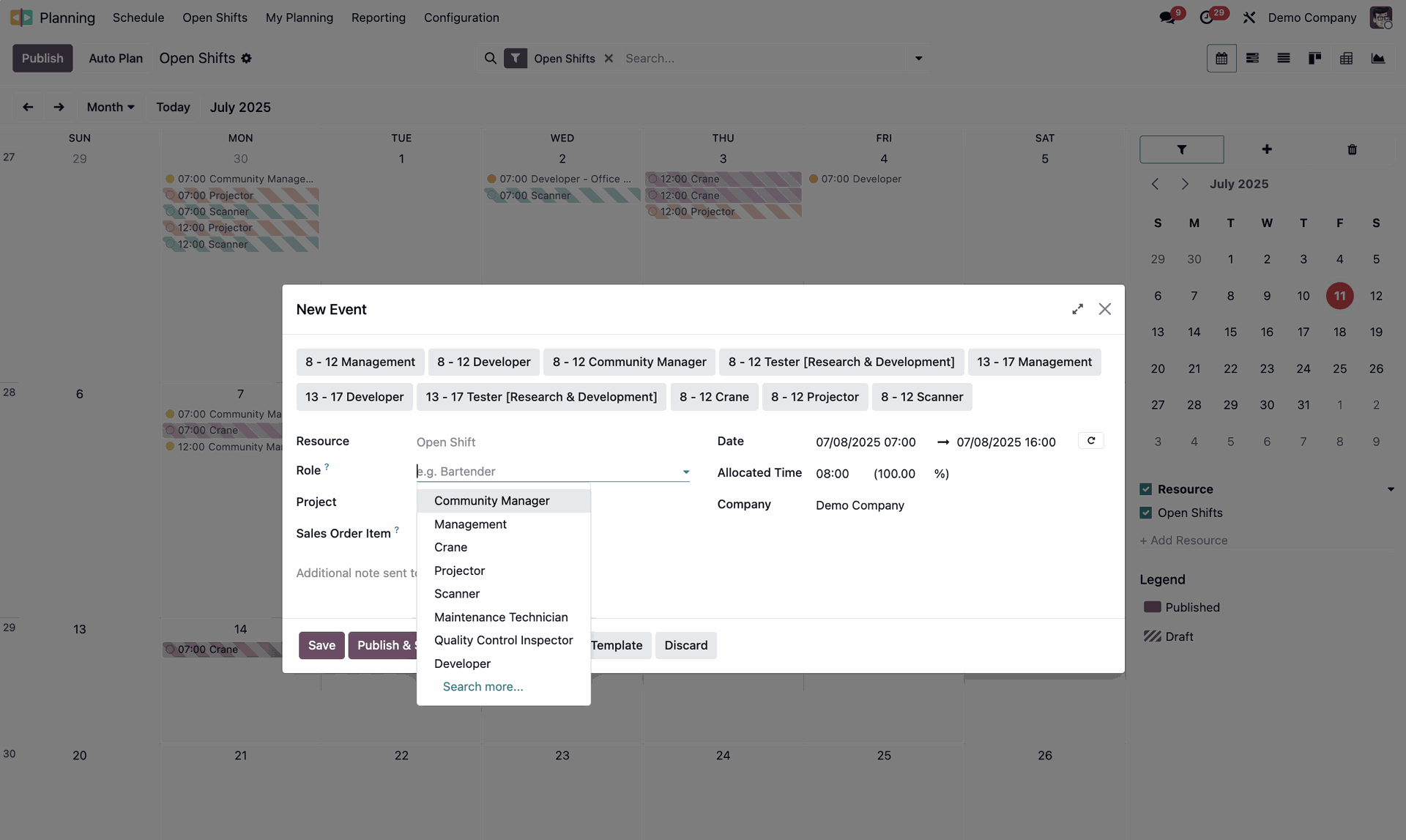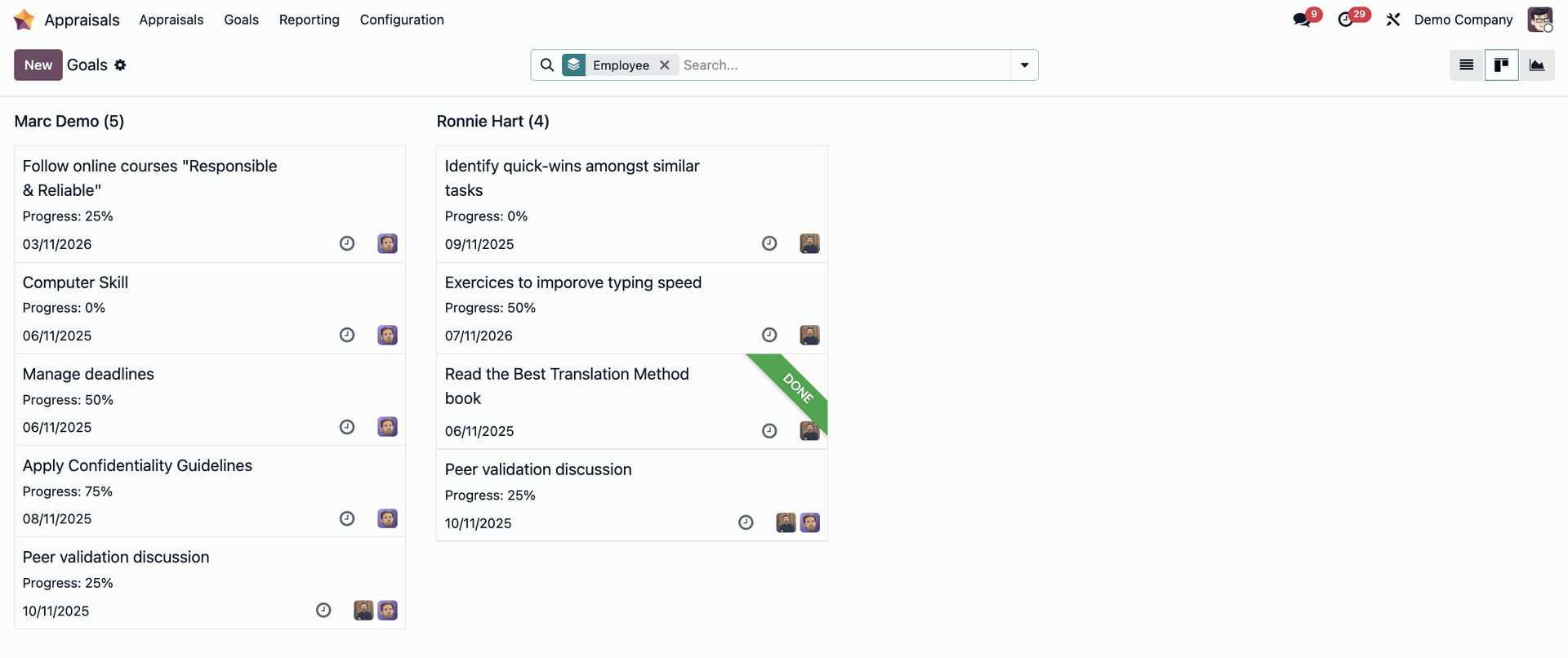The HR-related apps in Odoo form a complete people management system that covers recruitment, time tracking, shift planning, appraisals, and payroll.
For international teams, they can also adapt to compliance with country-specific labour laws and multi-company setups, all within the Odoo ecosystem.
Discover how Odoo HR works, which use cases it supports, and how to extend it for full legal compliance.
Table of contents
The Odoo HR Suite unifies people management into one system
Odoo HR handles the full employee lifecycle, from recruitment to development
Odoo HR adapts to legal frameworks across countries
Enforce country-specific break rules with a multi-company breaktime solution
Odoo HR supports real-world use cases across teams
Connect recruitment and onboarding through custom workflows
Shift planning and time tracking run in real time
Employee development can be structured by setting goals in Appraisals
The Odoo HR Suite unifies people management into one system
Odoo HR brings together every core HR task in one platform. It supports employee records, working hours, time off, hiring, feedback, and more.
Each module connects with others in real time, but this doesn’t mean that HR data sits in silos. Workflows can move from recruitment into onboarding, from working hours into payroll, and from appraisals into development plans.
Odoo HR handles the full employee lifecycle, from recruitment to development
The system is structured as a suite of apps and each one handles a different area of the employee lifecycle.
Every app works independently but shares the same data structure. This ensures consistency across departments and roles.
Employees
Stores contracts, departments, working hours, and personal info.
Time Off
Tracks leave requests and balances by type.
Attendances
Records working time using check-in and check-out.
Payroll
Calculates payslips based on rules and working hours.
Recruitment
Manages open positions and candidate pipelines.
Appraisals
Schedules reviews with templates and goals.
Planning
Assigns shifts and tracks workload across teams.
Expenses
Handles reimbursements and employee spending.
Odoo HR adapts to legal frameworks across countries
Companies operating across multiple countries must meet a range of labour law, especially around working time, maximum hours, and mandatory breaks.
These rules often differ not just by country, but by region, contract type, or legal entity.
Odoo HR supports this complexity out of the box through:
- Public holiday calendars and working schedules per company.
- Role-based contracts with different salary structures.
- Localised time-off rules and approval hierarchies.
- Multi-company separation of employee records and rules.
Enforce country-specific break rules with a multi-company breaktime solution
Some countries have stricter legal requirements for working hours and break times.
Our multi-company break time solution for the Odoo Attendance app applies country-specific rules based on employee setup. The module enables:
- Automatic break insertion after defined time thresholds.
- Multiple breaks per shift, with rounding logic.
- Daily work hour limits per contract.
- Company-specific enforcement within the same database.
This setup reduces compliance risk, eliminates manual tracking and ensures consistent attendance data for payroll and audits, even in complex, multi-country operations.
Example: A team in Germany may receive a single 30-minute break after 6 hours, while a team in Spain may receive two breaks at separate intervals. The system applies both rules correctly, without manual input.
Odoo HR supports real-world use cases across teams
Odoo HR isn’t a singular app or even various modules, but rather a working system used by teams across operations, admin, and leadership. Each feature connects to specific needs in recruitment, time tracking, development, and daily management.
The following examples show how Odoo HR supports everyday processes, from the moment a candidate is hired to long-term employee growth.
Connect recruitment and onboarding through custom workflows
The recruitment app tracks open roles and applications using custom pipelines. Each stage from CV review to interview and offer is handled through structured actions and user assignments.
Once a candidate is hired, the system creates an employee record linked to their contract, working schedule, and onboarding tasks.
HR teams can assign digital signature requests, upload signed contracts, and trigger training or equipment handovers through connected apps.

Application status pipeline as seen in the Recruitment app’s Kanban view
Shift planning and time tracking run in real time
Planning and Attendances work together to cover workforce scheduling and daily time capture.
Managers assign shifts per role, location, or individual. Employees access their shift calendar in the portal and log hours on-site or remotely.
All working time is recorded live and connected to payroll, project cost tracking, and time-off calculations. Where required, legal rules for maximum hours or enforced breaks apply automatically.

Open Shift planner that connects to allocated time in the Planner app
Employee development can be structured by setting goals in Appraisals
Appraisals follow structured timelines and forms, depending on seniority, role, or time in position. Reviews can include both rating scales and open feedback fields.
Objectives can be set and linked to future evaluations. Completed reviews are stored in the employee record and used to inform decisions around training, compensation, or promotion.

Goals set per employee in the Appraisals app
Odoo HR Suite integrates seamlessly with the entire system
Odoo HR is designed to work with other Odoo apps. This removes the need for separate systems, duplicate entries, or complex handovers between departments.
These app connections keep data consistent and reduce errors. More importantly, they allow HR to act as part of a connected business system and not a standalone department.
Each part of the HR workflow feeds into the apps that support business operations. The most important app connections include:
Accounting
Payslips, reimbursements, and benefit costs are booked automatically. This keeps financial records consistent and up to date, without manual entry from HR teams or accountants.
Payroll
Working hours from Attendances and contracts from Employees feed directly into payslip calculations. Time-off balances, salary rules, and break time enforcement all affect the final payroll outputs.
Projects
Time tracked by employees through Attendances or Planning can be used in project cost tracking, client billing, or resource analysis. Billable hours can flow from HR to Project to Invoice in one chain.
Documents
Contracts, signed forms, certificates, and onboarding documents are stored in each employee profile. HR teams manage all compliance documents centrally, with access control by role or department.
Sign
Employees can review and sign contracts, NDAs, policy updates, or review outcomes digitally. Signed documents are automatically stored in the employee file, visible in both HR and Documents apps.
eLearning
Onboarding or skills development plans can be assigned and tracked from the employee record. Progress is stored and visible to managers as part of the appraisal cycle.
Build the right Odoo HR system for your team
If you’re looking for help to reduce admin, stay compliant and give employees a clearer experience across the board, reach out to our Odoo experts now.